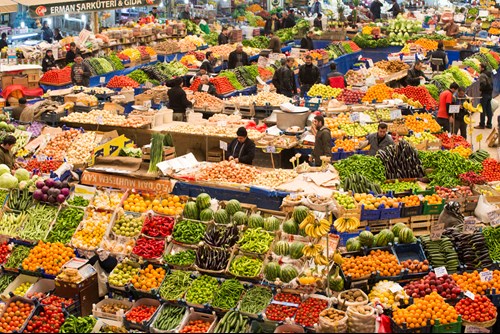Rethinking food strategies and the implications for food-hubs

A complete change in how we think about, produce and consume food presents multiple opportunities.
Agriculture and food production are witnessing major changes, especially around how food is produced. One of the main drivers facing producers is how to generate sufficient food, while adopting the most sustainable practices, making for a complex picture. This is relevant for all sectors involved in food production. Food-hubs that provide a focal point for food and drink production cannot escape these challenges, even if they are considered further downstream in the system.
In the UK, major changes in the strategic direction of agri-food production are under discussion. The over-arching driver is the changing climate that requires a complete rethink of how food is produced and considered by consumers. The urgency is clear but made even more acute with the short-term shocks leading to unprecedented market situations. The knock-on effects and need to consider the whole system of food security from farm to fork, has direct implications on food production and associated economics.
Over-arching food strategies that capture multiple aspects in agri-food production aim to generate a framework from which to address some of the challenges. They also help to see where the opportunities lie. DEFRA, in partnership with Innovate-UK, has led a series of workshops - ‘UK Agricultural Partnerships’ for Food Security - with a central tenet to discuss issues and potential solutions around food security within the UK setting.
The term ‘food security’ has many definitions, but it essentially comes down to the need to ensure sufficient, safe and nutritious food that is affordable and available for everyone in the country. It is a multi-faceted and complex subject that brings into play diverse aspects including agricultural production subsidies, import / export trading arrangements, nutrient quality, food trends, reformulation, socioeconomic status, education, retail influence, consumer drivers, ecological considerations, and soil, plant and animal health.
The issues facing food production in the UK come mainly from the challenges associated with climatic change, with specific focus around land use, sustainability requirements and the current state of food nutrient quality and human health. Short term shocks from the geo-political instability, energy costs and EU exit have amplified the impacts, and now present a very real possibility of a global repositioning of geo-politics and international trade. Undoubtedly, operating in a rural environment adds to the challenges. All of these aspects raise the urgent need to rethink food & drink production and supply for the UK.
However, a complete change in how we think about, produce and consume food presents multiple opportunities. The focus on nutrient quality as a means to improve human health presents opportunities, for example in the reformulation of existing products or generation of completely novel ones. De-globalisation and the pivot towards local production presents real opportunities: Scotland already has a word-class reputation for quality produce and access to abundant natural resources, providing multiple possibilities for innovative thinking. These changes require the need to adopt appropriate technological innovations in both primary and food production. Adapting to these changes undoubtedly bring challenges, and this is where partnerships with academic organisations play a key role to bridge the gaps and enable the opportunities to be met
The Seedpod is a food-hub development located on the SRUC Craibstone (Aberdeen) estate, part of a wider regional investment from Opportunity North East. It will support start-ups and established businesses with innovation and technology adoption, market and product development, global consumer focus and provide production space and development facilities. Partnership with SRUC enables direct interaction for education and training, research and consultancy, which covers food security aspects such as product development, sustainability practices and enhancing nutrition.
Posted by Nicola Holden on 06/10/2022
